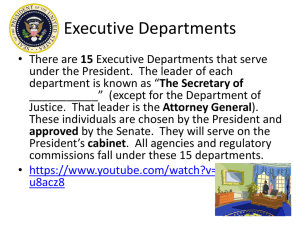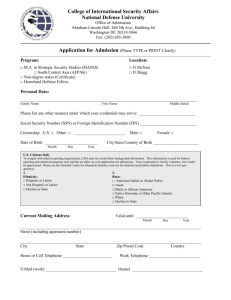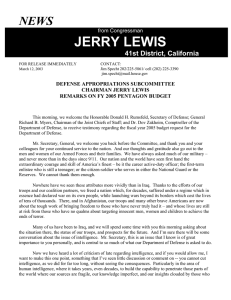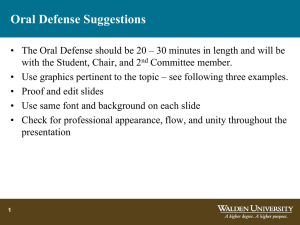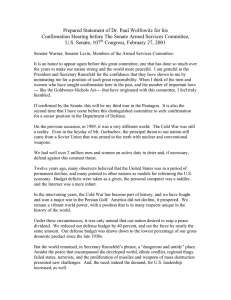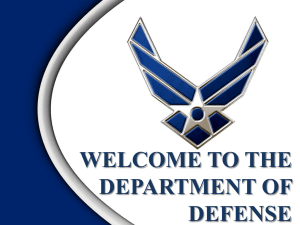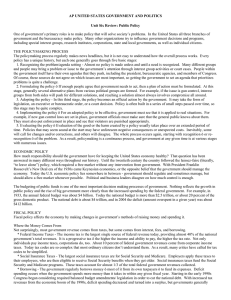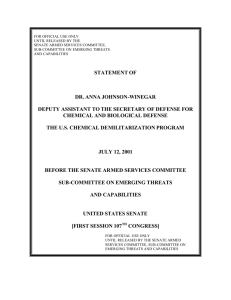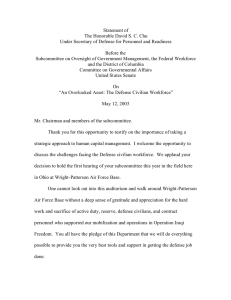The Military in a Democracy: A U.S. Perspective
advertisement
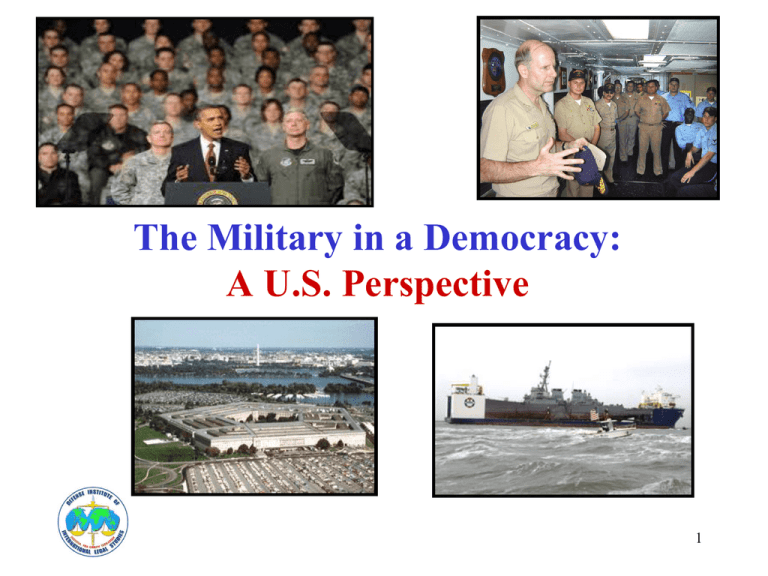
The Military in a Democracy: A U.S. Perspective 1 “….Clear and unchallenged civilian responsibility…” 2 Why Civilian Control in U.S.? • Colonial immigrants victims of military oppression in native countries • French and Indian/Seven Years War • American Revolution 3 Role of the Military U.S. Constitution – form a more perfect union – establish justice – insure domestic tranquility –provide for common defense – promote general welfare – secure the blessings of liberty 4 1781-1917 • Militia Act of 1792 • The “Age of Free Security”- 1815-1917 – few external threats – no reason to challenge civilian control • The Civil War 1861-1865 – President Lincoln – “citizen-soldier” concept in action 5 1918 - 1949 • 1945 - 1992 every U.S. President had served in the armed forces • Military conscription only in major wars • Post-WWII defense strategy shifted 6 The Cold War • • • • New policy of “containment” No military demobilization after WWII U.S. maintained large standing forces Reserve system was implemented 7 New Military Roles • Military enters into law enforcement arena in 1980’s in support role • 1986 drug trafficking designated a national security threat • Military begins support for counter-drug law enforcement: – equipment – facilities – training – intelligence 8 Today’s Military • Composed of a volunteer force • Roles include: – – – – – – – National security Humanitarian actions Multinational operations Peace operations Fighting non-state terrorists Law enforcement support Environmental protection 9 Branches of Government CONSTITUTION EXECUTIVE LEGISLATIVE JUDICIAL 10 Executive Function • President - Commander in Chief – National Command Authority – National Security Council (NSC) • Secretary of Defense – Joint Chiefs of Staff – Departments = Administration – Combatant Commanders = Operations 11 President = an Elected Civilian • Appoints officers and Secretary of Defense • Submits budget • Balances Foreign Policy and use of military 12 Congress ~ Senate and House of Representatives ~ • to raise and support armies • to provide and maintain a navy • to provide for state militias when called into federal service 13 Legislative Function • War Powers • Regulation of military • Promotions • Budget • Advise and Consent 14 War Powers Resolution • requires consultation with Congress by President • requires report by the President on specified deployments • places a 60-90 day limit on deployments absent express Congressional consent 15 Judicial Functions • Interpretation of the Law • Criminal Appeals • Civil Liability 16 Judicial Branch and the Military • Supreme Court may hear appeals from Court of Military Appeals • Suits may be brought against the U.S. government after exhausting administrative remedies 17 Defense Organization • President – Commander in Chief of Armed Forces • National Security Council – President – Vice President – Secretary of State – Secretary of Defense + others 18 Department of Defense • Headed by Secretary of Defense – cabinet level status – directly controls the three service Secretaries • A true civilian – must not have served in military during the past ten years 19 Joint Chiefs of Staff (JCS) Chairman Vice Chairman Chief of Staff – Army Chief of Naval Operations Chief of Staff – Air Force Commandant of the Marine Corps 20 Operational Chain of Command President Secretary of Defense Combatant Commanders 21 Departmental Roles • OSD tasks military departments • Military Departments train and equip forces • Chairman JCS plans and coordinates deployments and operations • Unified Combatant Commands conduct the operations 22 Unified Combatant Commands • The operational command of the U.S. forces • Forces from 2 or more services • Broad and continuing missions 23 President Secretary of Defense Deputy Secretary of Defense CENTCOM PACOM SOCOM NORTHCOM SOUTHCOM EUCOM TRANSCOM STRATCOM AFRICOM 24 25 Coast Guard • Under the Dept. of Homeland Security • Dept. of Defense in times of war • Primary role as a law enforcement agency • Also a military service 26 Conclusion “…a Japanese politician was heard to remark that [General MacArthur’s] firing taught the Japanese more about democracy than anything else America had said or done because no Japanese citizen ever thought anyone could fire Douglas MacArthur, a godlike figure in Japan.” …Joseph R. Farrell 27 28
